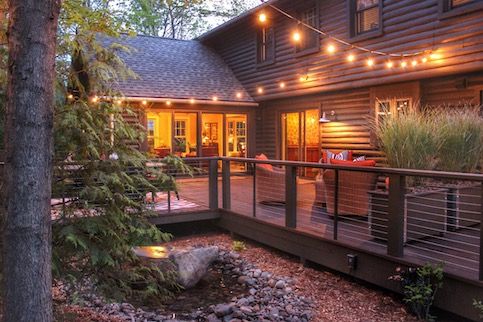From Renting To Buying Your Own Home: What You Need To Know

Buying a home while renting can be complicated, but it doesn’t have to be scary. Owning your own home has a lot of advantages over renting. You’ll have greater flexibility to create the home you want to live in, and rather than paying a landlord each month, you’re investing in a valuable asset for the future. Here’s how to stop renting and prepare to buy your own home.
Start Saving For A Down Payment
This can be one of the most intimidating steps when preparing to buy a home. There’s no quick trick for saving for a down payment, but an old-fashioned approach works best: Look for opportunities to reduce your spending and put away extra cash each month with a down payment goal in mind. If you receive a tax return, consider putting it directly into savings to help make a down payment later. Using gift money as a down payment is also an option, though there are some documentation requirements if you choose that route when applying for a mortgage.
Most borrowers will need to save money for a down payment, unless they qualify for a VA loan or a USDA loan. But don’t worry – there are many mortgage options available with a low down payment. Conventional loans like a 30-year fixed are available with as little as 3% down. FHA loans are available with a down payment of 3.5%. Understanding the different types of mortgages can help you figure out how much you’ll need for a down payment.
Find A Mortgage Today and Lock In Your Rate!
Get matched with a lender that will work for your financial situation.
See What You Qualify For
Home Purchase
Home Refinance
Tap Into Equity
Know Your Credit Score
A solid credit score is essential when getting a mortgage with a great interest rate. The minimum FICO® Score for most conventional loans is 620. However, depending on the loan program, a credit score as low as 580 may be acceptable.
If you’ve only rented in the past and don’t have additional revolving debt or tradelines reflecting a responsible payment history on your credit report, you score might not be as strong as it could be.
To help establish a positive credit rating, consider opening a low-limit credit card and paying off the balance each month by the due date. This will help create a credit history while keeping your credit utilization and debt-to-income ratio low and help you get on track to qualifying for a mortgage.
Credit utilization is the ratio (expressed as a percentage) of your outstanding credit card balance to the credit limit on the card. You’ll want to keep the ratio below 30% to keep it from negatively affecting your credit score.
You can determine your credit utilization by dividing your balance by your limit. For example, if you have a credit card limit of $5,000, you won’t want to exceed $1,500 as an outstanding balance in order to stay at 30% or below.
Know What You Can Afford
If you’re already renting, you can use your current monthly rent as a measuring stick for how much mortgage you can afford. Review your finances – do you have to stretch to pay your monthly rent? Are there areas you can reduce spending and free up cash for making a larger mortgage payment?
Our Home Affordability Calculator can help you estimate how much home you can afford with different monthly payments, and our Mortgage Calculator can show you what your monthly payment could be.
Debt-to-Income Explained
Knowing your debt-to-income ratio, or DTI, can help you see if you’re able to take on mortgage payments. Your DTI shows how well you are balancing your total minimum monthly debt against your gross monthly income (the amount you earn before taxes).
Monthly debt would include payments for credit card debt, car loans, student loans and any other recurring debt you might have. Lenders review your DTI to see if you’re keeping your monthly debt under control. The lower your DTI, the better.
Let’s look at an example. Say your monthly minimum debt payments were:
- $400 per month for student loans
- $200 per month for an auto loan
- $300 per month for credit card debt
Adding these together would give you a total minimum monthly debt of $900 per month. If your monthly income (before taxes) is $5,000, you can divide your debt of $900 by your $5,000 income to get a DTI of 18%.
When you apply to buy a home, your lender will include your estimated monthly mortgage payment to get a full picture of your expected DTI.
For example, if you wanted to buy a home that would have a monthly mortgage payment of $1,300, you would add that to the $900 you calculated earlier, bringing your total monthly minimum debt to $2,200. Dividing $2,200 by your income of $5,000 would give you a DTI of 44%.
The max DTI a lender can typically work with is 50%. Keeping your DTI below 50% shows your lender you can responsibly handle all of your payments, which can also improve your mortgage options.
Prepare For The Cost Of Owning A Home
Aside from the mortgage payment, there are additional costs to consider. Your utility costs may go up, you may need to buy additional furniture, and you’ll need homeowners insurance as well. Listing these costs out and knowing what you’re comfortable with can help you prepare for owning a home.
When you are renting, your landlord is typically responsible for repairs and maintenance. If your refrigerator or another appliance breaks, it’s your landlord’s obligation to replace it. As a homeowner, replacing and maintaining home appliances becomes your responsibility. You’ll want to keep funds available for unexpected repairs and costs like a leaky roof, a clogged kitchen sink or a dripping water heater.
A good rule of thumb is to set aside 1% of your home’s purchase price for home repairs. For example, if you purchase a home for $120,000, you’ll want to save $1,200 each year for unplanned repairs.
Managing repairs can be a relief rather than a burden, especially if you have an unreliable landlord. You get to decide how quickly the repairs are completed, instead of relying on someone else. You also get to control the nature of the repairs – a repair can be a good time to upgrade your home, an opportunity you won’t have if you’re renting someone else’s property.
Remember the cost of maintaining your new property outside the house, too. Your former landlord was likely responsible for landscaping and snow removal. If your new home has a yard or driveway, you might need to buy a lawn mower or snowblower soon after moving into your new home. Consider shopping at estate sales or resale shops. Buying used machines can be more affordable than buying brand-new ones.
Is Owning A Home Worth The Work?
Buying a house comes with new responsibilities and costs you don’t have to worry about when you’re renting, but it comes with a lot of advantages as well:
- You’ll have more freedom to create the home you want, including renovations and improvements.
- Unlike rent payments, mortgage interest is tax-deductible.
- Rather than paying a landlord, you are building equity that you can use in the future to achieve other goals with a cash-out refinance.
In other words, don’t let the additional work scare you away from buying a home. As long as you plan ahead and explore your options, buying a home gives you more control than renting from a landlord and can be a great investment in your future.
Find A Mortgage Today and Lock In Your Rate!
Get matched with a lender that will work for your financial situation.











